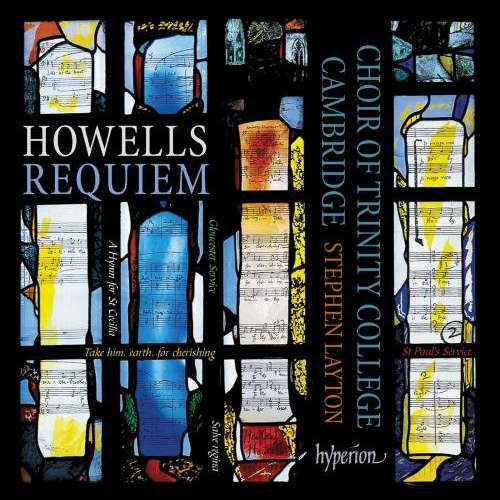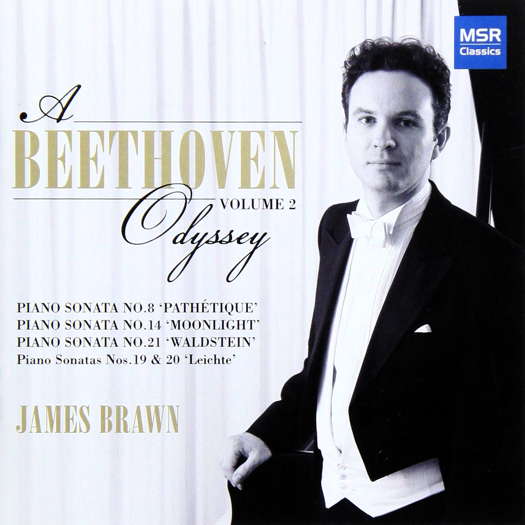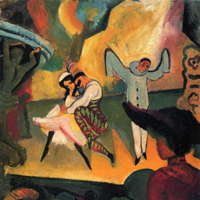 ROMANTICISM: Explore the late George Colerick's fascinating series of articles encroaching on the subjects of melody, romanticism, operetta and humour in music.
ROMANTICISM: Explore the late George Colerick's fascinating series of articles encroaching on the subjects of melody, romanticism, operetta and humour in music.
Siena Wins a Heroic Bet
GIUSEPPE PENNISI attends
the opening performance of the completely re-designed
Chigiana International Festival and Summer Academy
It was a bet. Indeed, it was a daring bet. In fact, as for the Ravenna Festival, recently discussed here on 28 June, only about a month ago the Chigiana International Festival and Summer Academy received the authorization to carry out its performing activities this July and August according to strict sanitary protocols.
For the Siena-based Chigiana, to reorganize the program was a more difficult task than for the Ravenna Festival. As seen here in previous years, the present format of the Chigiana International Festival and Summer Academy is quite new. Albeit based on a long-time experience in offering courses and masterclasses of international renown as well on that of a small annual festival (Le Settimane Musicali Senesi – the Siena Musical Weeks), and on other events (such as Siena Jazz and Summer in Siena), this is solely the fifth edition of the newly conceived festival. In addition, the festival gives emphasis to concerts of contemporary music by international artists; the participants in masterclasses and courses, as well as their instructors, often perform concerts of more traditional music. Finally, the Chigiana International Festival and Summer Academy can rely only on a few permanent staff members, mostly absorbed in the duties related to the masterclasses and the courses; in spite of the pandemic, as of today, the participants in these summer courses are 436 from thirteen countries. Instead, the Ravenna Festival with its summer and fall sessions and with its winter seasons offering opera, ballet and plays is equipped with a strong permanent staff. Thus, it was a heroic bet to reorganize the festival for open-air performances in such a short time. In Siena, concerts normally take place indoors in two small opera houses and in several churches with excellent acoustics, not open air as generally required by the anti COVID-19 protocols.
Siena won the bet. The Festival was inaugurated on Sunday 5 July 2020 with a rather unusual and innovative performance of musical theatre in the outer space of the magnificent cathedral, an important symbolic place because, due to the plague, Siena Cathedral could not be completed as foreseen in the original plans.
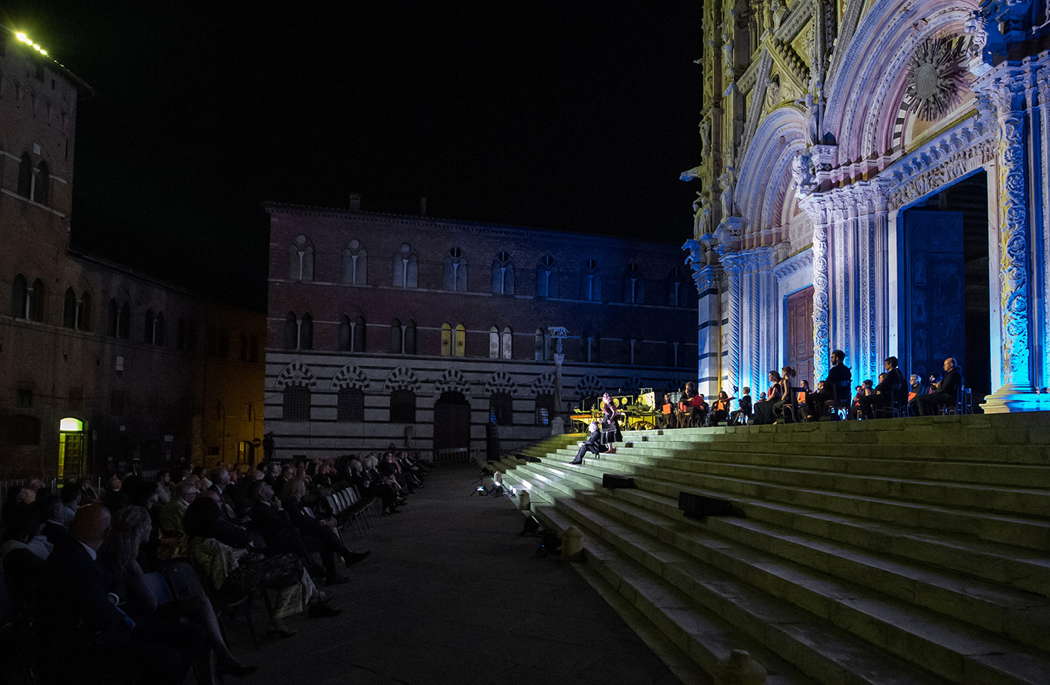
Siena Cathedral Square. Photo © 2020 Roberto Testi
The festival will last until 3 September 2020 and features eighteen events, including two world premieres. Due to an agreement with the Ministry of Foreign Affairs, the events will be streamed all over the world through the eighty-five Italian cultural institutes abroad; the Italian cultural institutes will also have access to the Chigiana Archives to organize seminars.
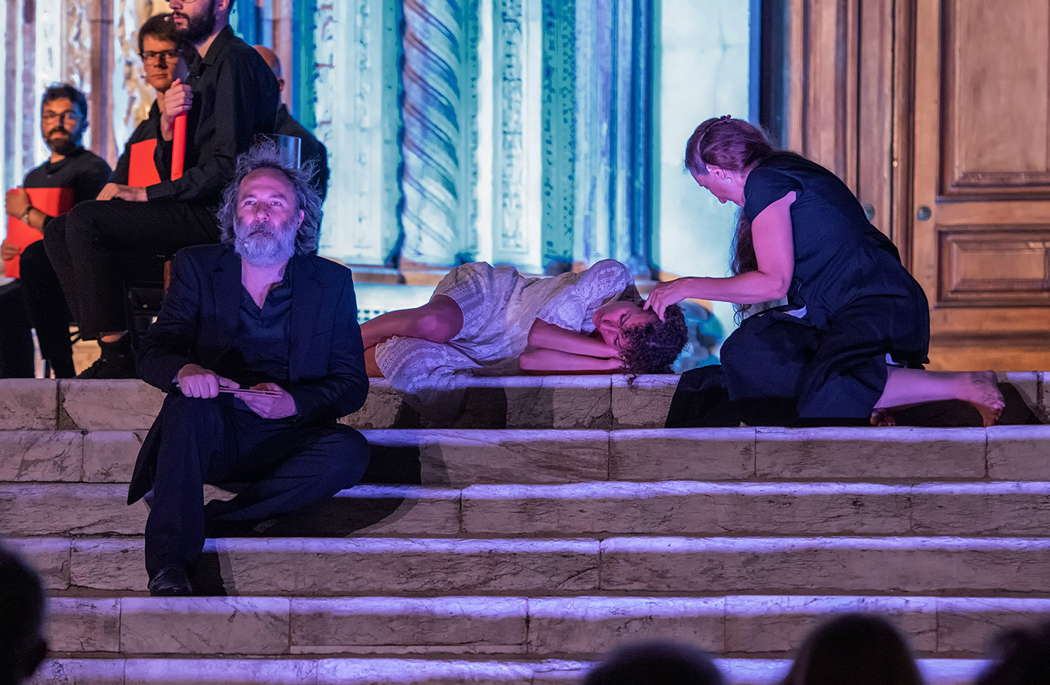
From left to right: actor Angelo Romagnoli, dancer Francesca Duranti and actress Maria Claudia Massari. Photo © 2020 Roberto Testi
I was in the audience for the opening night. The title of the performance was Io ho un sogno (I Have a Dream), but it is not based on Martin Luther King's life and battles. It deals with Luis Sepulveda, the Chilean intellectual and writer who died from COVID-19. In fact, it is an homage to all the victims of the new Corona Virus Disease. The authors are the dramaturg and stage director, Alessio Pizzech, who selected the Sepulveda's texts dramatized by two actors - Maria Claudia Massari and Angelo Romagnoli - and the artistic director of the Chigiana Foundation, the composer Nicola Sani, who commissioned the work and selected the musical pieces for the performance.
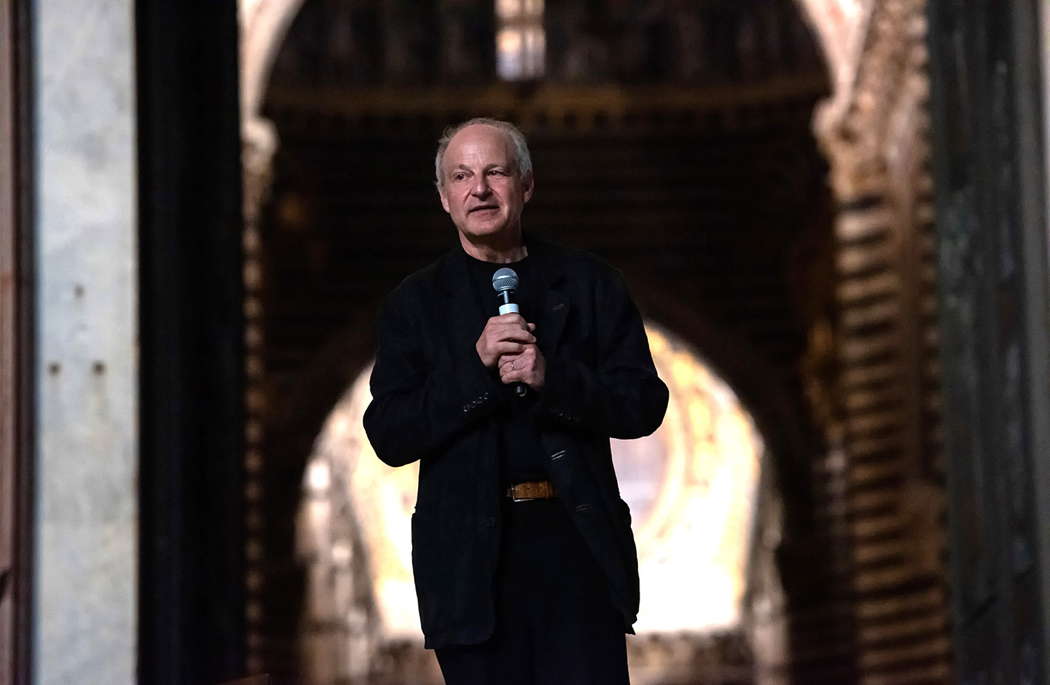
Nicola Sani, artistic director of the Chigiana Academy. Photo © 2020 Roberto Testi
Ten composers were featured, in order of appearance: Bianciardi, Curran, Sisask, Battistelli, J S Bach, Sciarrino, Glass, Whitacre, Cage, Nono, Reich, Casulana and Isaac. In short, from Renaissance - Casulana - to Baroque - Bianciardi and Bach - to the twentieth century and contemporary creators. In short, a pastiche, but with a noble meaning like those frequent in Baroque times such as The Enchanted Island, revived, with tremendous success, by the Metropolitan Opera House in 2011. The theme is not adventure and love as in most Baroque pastiches but a reflection on ethics in life and a meditation on death and the after-world.
The musical part of the performance was mostly entrusted to a new choral ensemble: the Coro della Cattedrale di Siena 'Guido Chigi Saracin', created three years ago and directed by Lorenzo Donati. The chorus members had a very hard task because, in about an hour, they had to handle very different styles covering four centuries of music. They did it very well and fully deserved the audience accolades at the end of the performance.
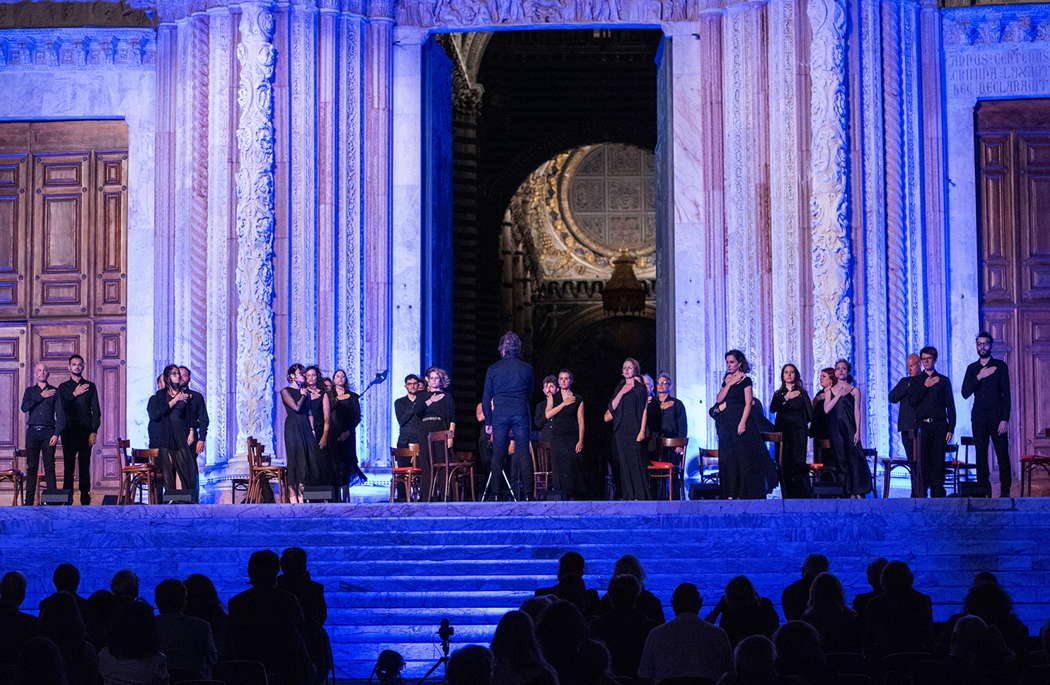
Coro della Cattedrale di Siena 'Guido Chigi Saracin', directed by Lorenzo Donati. Photo © 2020 Roberto Testi
In order to provide action during the choral moments, a choreographer (Francesca Duranti) danced on the steps of the cathedral.
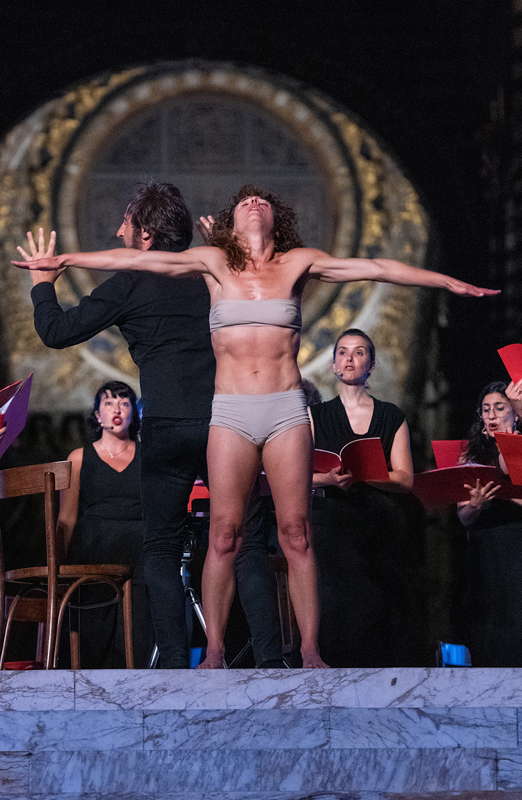
Dancer Francesca Duranti. Photo © 2020 Roberto Testi
To end with the vocal part, soprano Valentina Piovano had the difficult task of singing Luigi Nono's impervious Djamila Boupachà from Canti di vita e di amore (Songs of Life and of Love).
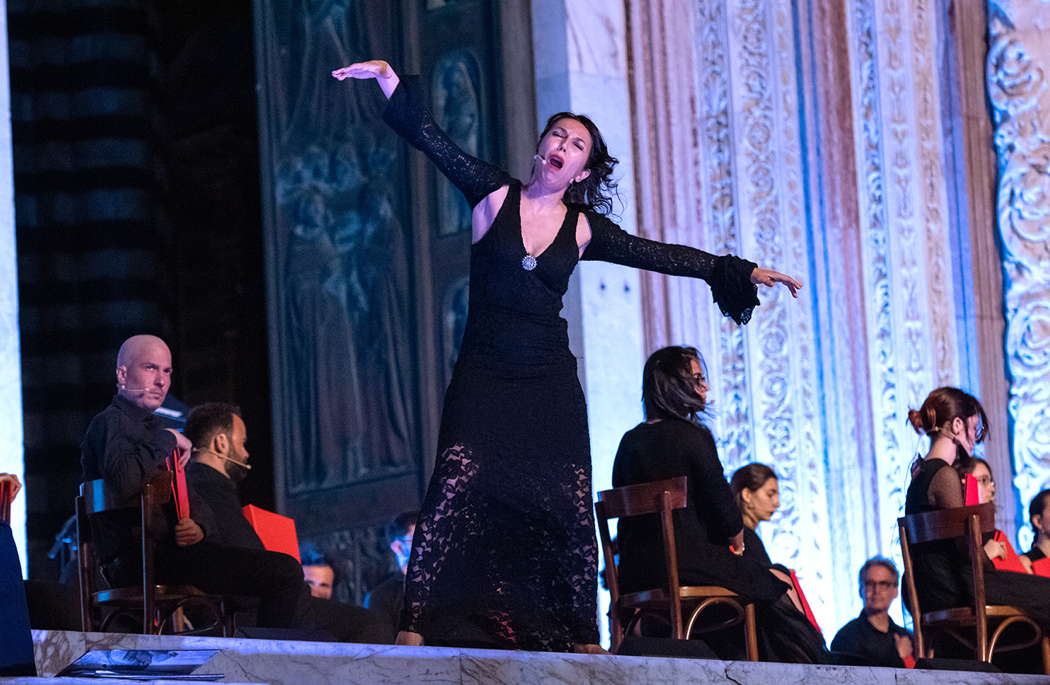
Valentina Piovano. Photo © 2020 Roberto Testi
The orchestra? A complex piece of percussion machinery, handled by Antonio Caggiano, replaced it, which could sound the bells of a church, the thunder in a storm, the sweet and delicate echoes of love, and the pleasures of life such as drinking whisky and smoking cigarettes - a theme of Sepulveda's writings.
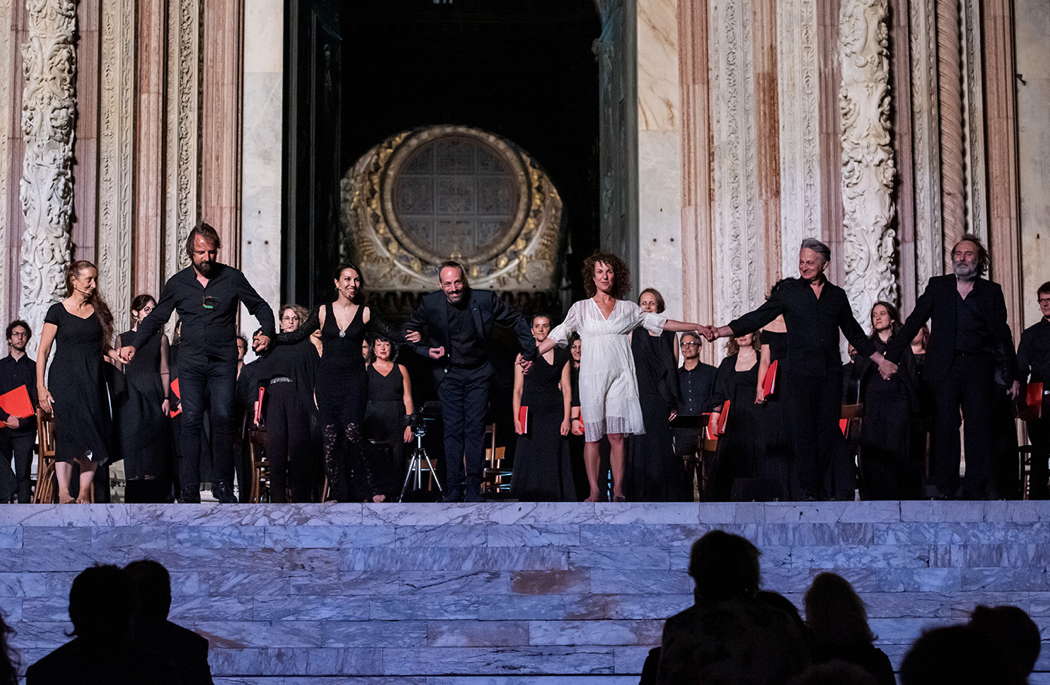
The final applause with, at the centre, Alessio Pizzech, director of 'Io ho un sogno'. Photo © 2020 Roberto Testi
In short, this was a fascinating evening which augurs quite well for the rest of the 2020 Chigiana International Festival and Summer Academy as well as for future years.
Copyright © 9 July 2020
Giuseppe Pennisi,
Rome, Italy

FURTHER LIVE CONCERT AND OPERA REVIEWS


